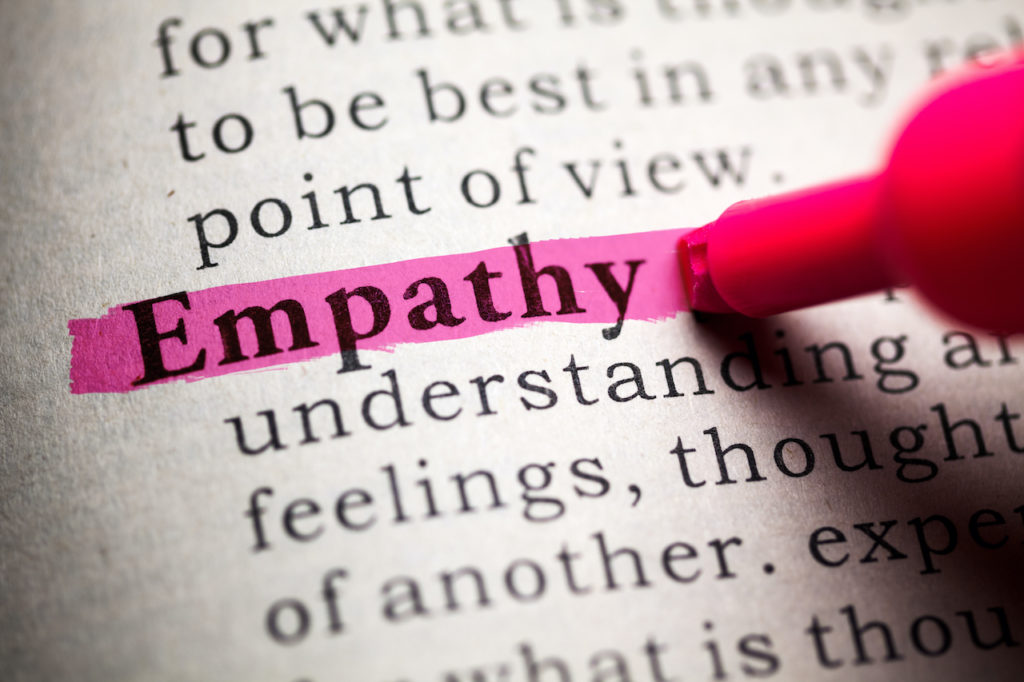By Dr. Jeffrey Gladden
I like to think that there are two types of people when it comes to practicing empathy: those who are overly good at it — empaths — and those who have serious difficulty understanding how others feel. But empathy exists on a spectrum, and neither of those two extremes is healthy.
So how do we practice a healthy level of empathy so we can love ourselves and others well? Let’s take a look.
Understanding Our Current Level of Empathy
First, let’s talk about the importance of understanding where we currently fall on the empathy spectrum.
For those of us who are empaths, we likely find ourselves getting caught up in other people’s emotions and needs. We feel others’ energy so strongly — whether positive or negative — that we seek to please people so they feel happy. In turn, we feel content too. Unfortunately, in pleasing others, we gradually lose the ability to distinguish between other peoples’ feelings and desires and our own. Our energies become intertwined.
Ultimately, we create a disconnect between our own feelings and belief systems and what we say and do. In the end, we get hurt; we become victims of our empathic nature.
If we find empathy challenging, we probably find ourselves trying to push our beliefs and feelings on others. Because we find it difficult to understand other peoples’ emotions, desires, and needs, we essentially try to bring people over to “our side.” We truly believe we’re helping people “see the light,” but in reality, we’re discrediting their unique and valid thoughts and feelings.
Ultimately, our limited ability to empathize makes it difficult for us to relate to others on a deep level, to love others well despite the fact we hold different beliefs.
So what can we do to shift ourselves toward practicing a healthy level of empathy so we can better love ourselves and others? Follow these tips:
Practice Self-Compassion
To have true empathy for others, we must practice kindness toward ourselves. We must understand our own self-talk. That means taking a non-judgmental attitude toward ourselves and our feelings, so we can discern why we feel what we feel.
By practicing self-compassion and understanding our thoughts and feelings more deeply, we can better discern our ingrained patterns. More importantly, we can better determine whether those patterns are helping or harming us and others.
Practice Active Listening
Everyone wants to feel heard. When we actively listen, we listen with all of our senses. We seek to understand the deeper why behind a person’s feelings, beliefs, wants and needs. Active listening requires full concentration on what a person says, so we can understand, remember, and respond rather than react.
Generally, we tend to assume too much and ask too little. To practice healthy empathy, we must ask questions with genuine interest. When we invite people to speak openly and actively listen to their response, we’ll better understand how others see the world.
Be Authentic
To be authentic, we must first be aware of our genuine emotions, beliefs, and needs. Only then can we align what we say and do with how we feel and what we think. When I’m in a situation that I don’t necessarily want to be in, I like to ask myself: Do I really want to do this? And if I do, why do I want to do it? Is it for external validation, or is it something that feels authentic to who I am?
Being authentic to ourselves and in our interactions with others is the key to having a healthy relationship with empathy.
Set Boundaries
When we’re highly attuned to other people’s feelings, we walk a thin line between understanding those emotions and feeling them as our own. That’s where practicing personal integrity and setting boundaries is critical. We are not responsible for making other people feel happy; we are accountable for our own happiness.
Finding our happiness requires us to distinguish between our emotions and other peoples’ feelings. We must be aware of what’s inside of us and what’s outside. Once we understand our authentic feelings, desires, and needs, we can develop boundaries that allow us to have a healthy relationship with empathy. We can practice compassion and love others well without losing ourselves in the process.
Share What You Can
No one will share our every belief — that’s okay! Rather than force our beliefs on others, we must accept we’re different people with different views. I’ve come to learn that it’s not my responsibility to change other people. Even if we don’t agree on something, chances are we can still connect on something else. We share what we can with those individuals and connect with other people on different levels.
We can love people authentically despite our differences. We can also love others well without losing ourselves in the process. Practicing sincere empathy means actively trying to understand where people are coming from while deeply understanding our own feelings and beliefs. When we empathize healthily, we love and respect ourselves while simultaneously loving and respecting others.
